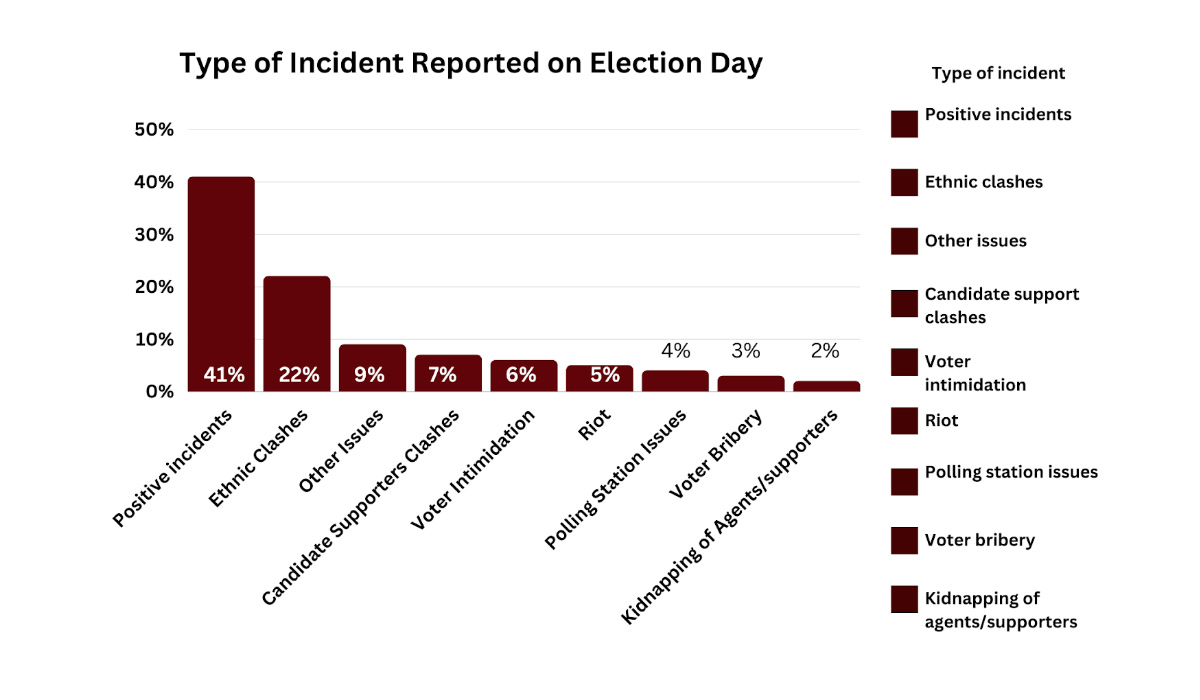Kenya held its general elections on August 9, 2022. A total of 14 million registered voters turned up for the exercise. Angaza Kura, a free election monitoring tool, conducted a survey to capture the experience of voters as they engaged in the electoral process as well as map incidents of electoral violence and more. The survey, which ran from August 1 to August 31, 2022, covered 29 counties in Kenya and targeted adults aged 18 years and above. The survey instrument consisted of closed-ended and open-ended questions that were designed to gather information on the pre-election, election day and post election. The data collection process involved administering an online survey through a web-based platform. With a sample size of 267 respondents which is a smaller size than what is considered statistically significant of a calculated sample of 1,067 to represent the entire 14 million voters turn out therefore, this provided an indication rather than a definitive representation of the population.
The survey focused on the voter’s experiences during the election process and the extent to which they felt the elections were free, fair, and credible. It aimed to establish whether Kenyans had exercised their right to vote, as well as their satisfaction with the election results and the entire electoral process. Additionally, the survey sought to establish if there had been any form of violence during the election period.
Pre-election period
The survey revealed that in the pre-election period, clashes between supporters of opposing candidates were the most reported incident in Wajir, Uasin Gishu, and Kakamega. This suggests that clashes that were instigated by candidates or their supporters recordedthe significant source of tension and disagreement among individuals and groups. Interestingly, since Kenya introduced multiparty elections in 1992, the 2022 elections was the first electoral cycle were ethnic tensions did not record the highest source of conflict. However, they were still a factor of tension during the election season.

The majority of respondents also rated their area as very peaceful or peaceful. However, a significant minority gave a rating of not very peaceful or violent.
 Voter Education and Campaigns Experience
Voter Education and Campaigns Experience
The survey also examined the voter education and campaign experience. Majority of the respondents were not voting for the first time. 23% of the respondents were first time voters. This shows that a relatively small portion of the population is experiencing the voting process for the first time. More than three-quarters of the respondents said they had received sufficient information to prepare them to vote in the election.
 However, over three-quarters of the respondents felt that hate speech was highly present during the campaign period.
However, over three-quarters of the respondents felt that hate speech was highly present during the campaign period.
 Half of the respondents reported witnessing voter intimidation or incitement during the campaign period in their area. This despite, the aggressive civic education by government and civic society. Inspite of recorded increase in political hygiene among political actors, the analysis reveals the need to re-think civic education with respect to increasing political hygiene during electoral processes.
Half of the respondents reported witnessing voter intimidation or incitement during the campaign period in their area. This despite, the aggressive civic education by government and civic society. Inspite of recorded increase in political hygiene among political actors, the analysis reveals the need to re-think civic education with respect to increasing political hygiene during electoral processes.
Election Day
On election day, the most reported incidents reported mailny involved the voter habits, viz. how Kenyans carried themselves as they voted. In most polling stations, order and sense of calm was recorded among Kenyans. Ethnic clashes, and candidate supporters clashes were however reported. Most of these events were organic and sporadic in different areas. This suggests what Fredrick Ajwang and Geoffrey Lugano had predicted in a piece for this platform, that the August 2022 elections will not only will they be relatively peaceful but also that Kenya’s history of large-scale political violence may be a thing of the past.

 The report also indicated that respondents were split on whether the elections were free, fair, and credible and whether they were satisfied with the elections results. 51% indicated that the elections were free, fair and credible and 49% indicated that the elections were not free, fair and credible.
The report also indicated that respondents were split on whether the elections were free, fair, and credible and whether they were satisfied with the elections results. 51% indicated that the elections were free, fair and credible and 49% indicated that the elections were not free, fair and credible.


More than 10% of all the respondents came from Kisumu, Nairobi, Vihiga, Kwale and Mombasa.

The survey found that the respondents differed on this issue, and it aimed to explore the underlying reasons for this split in opinion. One possible explanation for the split in opinion is that the nature, the issues, and the organising principles of these elections. To be specific, not having massive violence, a shift from ethnic politics of organising to religous, class and economic organisng, contributed to this shift. Also, how the results were tallied was a contributor to the divergent opinion.
In conclusion, the Angaza Kura survey provides valuable insights into the experiences and concerns of Kenyan voters during the 2022 general elections. The survey highlights the need for greater attention to be paid to issues related to hate speech, incitement, and electoral violence. Additionally, the survey underscores the importance of ensuring that the election process is free, fair, and credible, and that all voters are informed and prepared to participate in the electoral process. By addressing these issues, Kenya can take significant steps towards creating a more peaceful, democratic, and inclusive society.
–
This publication was funded/co-funded by the European Union. Its contents are the sole responsibility of The Elephant and do not necessarily reflect the views of the European Union.








